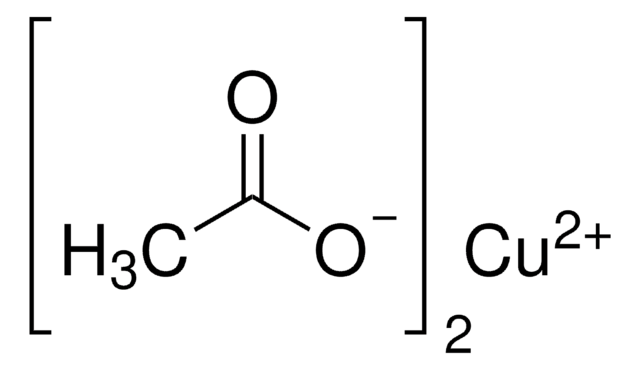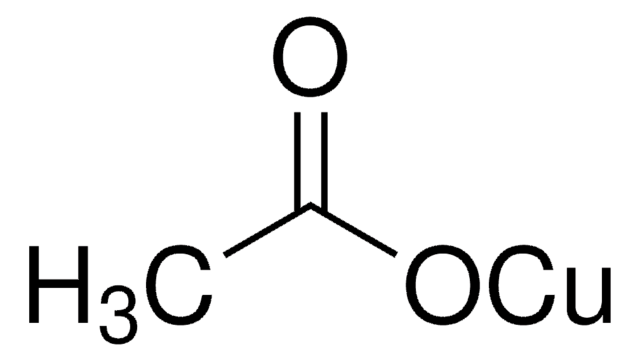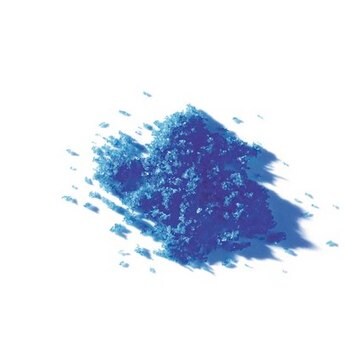1.02711
Copper(II) acetate monohydrate
for analysis EMSURE® ACS
Synonym(s):
Copper(II) acetate monohydrate, Cupric acetate
About This Item
Recommended Products
grade
ACS reagent
Quality Level
product line
EMSURE®
Assay
99.0-102.0% (iodometric)
form
solid
potency
501 mg/kg LD50, oral (Rat)
impurities
≤0.01% Insoluble matter
pH
5.2-5.5 (20 °C, 20 g/L in H2O)
mp
115 °C
solubility
72 g/L
density
1.88 g/cm3 at 20 °C
bulk density
1100 kg/m3
anion traces
chloride (Cl-): ≤0.001%
sulfate (SO42-): ≤0.005%
cation traces
Ca: ≤0.005%
Fe: ≤0.002%
K: ≤0.01%
N: ≤0.01%
Na: ≤0.01%
Ni: ≤0.002%
Pb: ≤0.004%
Zn: ≤0.002%
storage temp.
2-30°C
InChI
1S/2C2H4O2.Cu.H2O/c2*1-2(3)4;;/h2*1H3,(H,3,4);;1H2/q;;+2;/p-2
InChI key
NWFNSTOSIVLCJA-UHFFFAOYSA-L
Related Categories
Application
- Click-chemistry mediated synthesis of OTBN-1,2,3-Triazole derivatives exhibiting STK33 inhibition with diverse anti-cancer activities.: This study utilizes Copper(II) acetate monohydrate in the click-chemistry synthesis of OTBN-1,2,3-triazole derivatives, demonstrating their potential as inhibitors of serine/threonine kinase 33 (STK33), which could be significant for developing new anticancer treatments (Vala DP et al., 2024).
- Synthesis and antifungal activity of slow-release pyridinylcarbonyl chitooligosaccharide copper complexes.: This research describes the synthesis of slow-release antifungal agents using Copper(II) acetate monohydrate to form copper complexes with pyridinylcarbonyl chitooligosaccharides, highlighting their efficacy against various fungal pathogens (Liu W et al., 2022).
- Bis-triazolylchalcogenium-Functionalized Benzothiadiazole Derivatives as Light-up Sensors for DNA and BSA.: The paper reports on the development of bis-triazolylchalcogenium-functionalized benzothiadiazole derivatives synthesized using Copper(II) acetate monohydrate, which are used as fluorescent sensors for detecting DNA and bovine serum albumin (BSA) (Krüger R et al., 2021).
- LED-driven photocatalysis of toluene, trichloroethylene and formaldehyde by cuprous oxide modified titanate nanotube arrays.: This study involves the use of Copper(II) acetate monohydrate in the synthesis of cuprous oxide-modified titanate nanotubes, enhancing the photocatalytic degradation of various organic pollutants under LED illumination (Chen CH et al., 2022).
Analysis Note
Insoluble matter: ≤ 0.01 %
Chloride (Cl): ≤ 0.001 %
Sulfate (SO₄): ≤ 0.005 %
Total nitrogen (N): ≤ 0.01 %
Ca (Calcium): ≤ 0.005 %
Fe (Iron): ≤ 0.002 %
K (Potassium): ≤ 0.01 %
Na (Sodium): ≤ 0.01 %
Ni (Nickel): ≤ 0.002 %
Pb (Lead): ≤ 0.004 %
Zn (Zinc): ≤ 0.002 %
Corresponds to ACS
Legal Information
Signal Word
Danger
Hazard Statements
Precautionary Statements
Hazard Classifications
Acute Tox. 4 Oral - Aquatic Acute 1 - Aquatic Chronic 2 - Eye Dam. 1 - Skin Corr. 1B
Storage Class Code
8B - Non-combustible, corrosive hazardous materials
WGK
WGK 3
Flash Point(F)
does not flash
Flash Point(C)
does not flash
Certificates of Analysis (COA)
Search for Certificates of Analysis (COA) by entering the products Lot/Batch Number. Lot and Batch Numbers can be found on a product’s label following the words ‘Lot’ or ‘Batch’.
Already Own This Product?
Find documentation for the products that you have recently purchased in the Document Library.
Customers Also Viewed
Our team of scientists has experience in all areas of research including Life Science, Material Science, Chemical Synthesis, Chromatography, Analytical and many others.
Contact Technical Service









